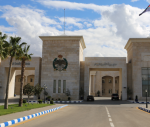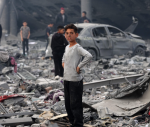You are here
Watchdogs criticise executions in Jordan as engineers syndicate hails move
By JT - Dec 22,2014 - Last updated at Dec 22,2014
AMMAN — Human Rights Watch (HRW) on Sunday criticised the government for executing 11 convicts.
In a statement released on the same day of the executions, Middle East Director at Human Rights Watch Sarah Leah Whitson said “with these executions, Jordan loses its standing as a rare progressive voice on the death penalty in the region.”
“Reviving this inherently cruel form of punishment is another way Jordan is backsliding on human rights,” Whitson added.
Executions in Jordan have been frozen since March 2006.
Officials have said on Sunday that the government decided to reinstate capital punishment in Jordan as “a deterrent, especially since it has become a public demand following the occurrence of dozens of murders in our society”.
Officials also said execution is also sanctioned by Sharia (Islamic law).
Authorities confirmed on Sunday that there are 113 individuals, including 12 women, who are awaiting execution in Jordan.
The issue of capital punishment has been under debate in Jordan between activists who oppose the death penalty, and officials and lawyers who believe it should stay.
The Jordan Engineers Association released a statement on Monday commending the decision to execute the 11 convicts, describing it as a move to safeguard social peace and deter potential criminals from taking the lives of others.
Several people have been on death row for a long time, including one inmate who was sentenced to death in the mid-1970s on spying charges, officials have said.
Article 93 of the Constitution reads that “no death sentence may be carried out unless ratified by the King. Every such sentence shall be submitted to him by the Council of Ministers along with the council’s view on it.”
HRW opposes capital punishment under all circumstances, as a “practice unique in its cruelty and finality”, according to the statement.
In 2013, following similar past resolutions, the United Nations General Assembly called on countries to establish a moratorium on the use of the death penalty, progressively restrict the practice, and reduce the offences for which it might be imposed, with a view toward its eventual abolition, the HRW statement said.
UN Secretary General Ban Ki-moon has also called on countries to abolish the death penalty, it added.
On Monday, the Jordan Human Rights Society issued a similar statement, describing the decision to reactivate the death penalty as a step backwards, away from reaching the “humane and civilised” decision to abolish capital punishment as 137 countries have already done.
Citing international studies, the society said the death penalty is not an effective deterrent that contributes to lowering crime rates, urging the government to go back on its decision and engage in dialogue with the public on its economic, social and human rights policies to address the root causes of crime.
Related Articles
AMMAN — Human Rights Watch (HRW) said on Sunday that Jordan joined “a worrying regional trend towards increasing executions” when it hanged
AMMAN — The State Security Court (SSC) on December 7 sentenced a Jordanian professor to a two-year imprisonment for criticisms posted on soc
UK Ambassador to Jordan Peter Millett issued a statement on Sunday expressing “regret” over the government’s decision to implement the death penalty and execute 11 convicts.















